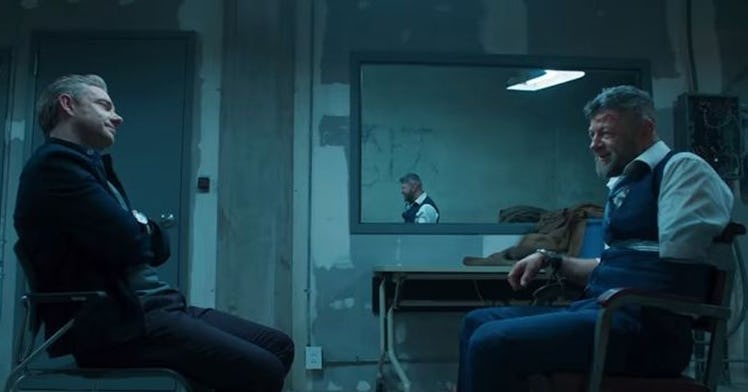
Refresh Your Memory On Agent Ross Before You Run To See 'Black Panther'
Black Panther is a film written, directed and starring people of color. There are only two white characters in the film, Andy Serkis, who plays bad guy Ulysses Klaue, and Martin Freeman, who plays the surprisingly good guy Everett Ross. When T'Challa first runs into Ross in a casino in South Korea, it's clear the two of them have met before. But who is Agent Ross? Should audiences recognize him? And how on earth, in the history of the entire everything, does a white American CIA agent wind up being the character doing good for a people in Africa, when it has historically been the opposite? Warning: Spoilers for Black Panther follow.
Everett Ross was first introduced to in the Marvel Cinematic Universe in the same film as T'Challa: Captain American: Civil War. His part was small enough that fans didn't get a good sense of how he was different from the comic book version. Added in during the late 1990s run of Black Panther comics, in Ka-Zar Vol. 3, #17.
He was invented as an audience surrogate for the white audience who were being targeted at the time, a weird mix of Alex P. Keaton from Family Ties and Chandler Bing from Friends. His role, according to writer Christopher Priest was to view Black Panther the way he felt Marvel had come to view the character: "Just Some Guy who was routinely overshadowed by heroes in which they were more invested."
In that way, Ross is just as much an antagonist as a protagonist. Yes, he helps out T'Challa from his position as a US State Department employee. But he's not all that convinced Black Panther is that big a deal as a superhero. Ross sees him like Hawkeye, that guy who's always in the Avengers movies, but no one has any interest in having a standalone movie about.
While Ross' introducing in Civil War promotes him in the CIA from the State Department, gives him pilot training, and a generally more impressive backstory, most fans went into the film half expecting Ross to be as much a bad guy as a good one. At first, it seems like that's how Black Panther is going to play it. Ross has no interest in helping out T'Challa get Ulysses Klaue. He's not swayed by the idea that he owes T'Challa Klaue for Black Panther's takedown of Zemo in Civil War. He sees the Wakandans as a nuisance, something standing in the way of his deal-making sting, not as a helpful superhero showing up to be useful on the mission.
But then the film switches gears. Somewhere between Ross picking up Okoye and Nakia after their car is destroyed, and jumping in front of Nakia and taking a bullet for her, Ross is promoted from a morally grey character who is mostly doing things as they suit him, into an actual good guy.
He's still a surrogate for white audiences, marveling at the Wakandan technology. But coming in so late to the story means that the audience no longer quite needs a surrogate in that way, so he's also doubling as comic relief, discovering that Klaue's tale of Wakanda's "textiles, shepherds, cool outfits" being a front is true.
And unlike decades of history, for the first time, a CIA agent finds themselves in an African country where they're not meddling in the affairs of the state to benefit the United States. (Though one could argue that stopping Killmonger's vision of a Wakandan empire that would conquer the U.S. is in his country's interests.) But in reality, he's fighting alongside the people who saved him, trying to help them save the world. Not bad for a man in a grey flannel suit.